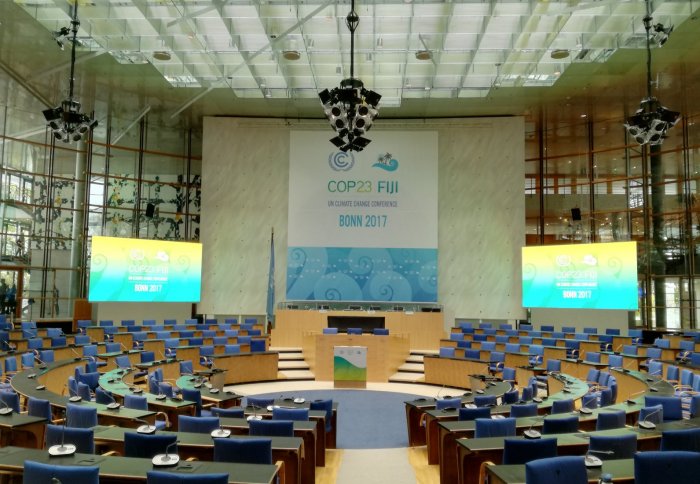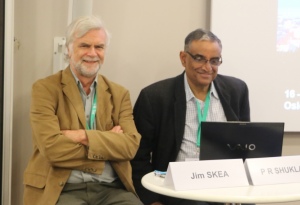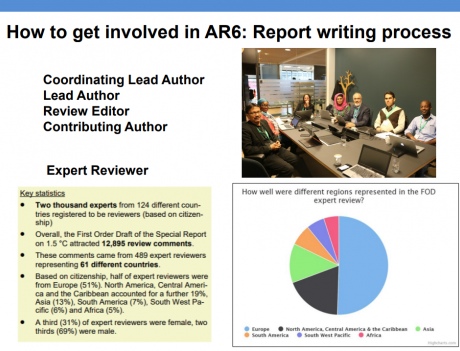The IPCC and Centre for Environmental Policy at the UN Climate Change conference

The Intergovernmental Panel on Climate Change (IPCC) Working Group III, based at the CEP, was at the recent United Nations climate change conference.
From 6 to 17 of November 2017, nearly thirty thousand representatives from governments, international organisations, businesses, NGOs and universities came together in Bonn for the 23rd Conference of Parties (COP23) of the United Nations Framework Convention on Climate Change (UNFCCC).

Jim Skea and P.R. Shukla, Co-Chairs of the IPCC Working Group III
The Intergovernmental Panel on Climate Change (IPCC) Working Group III, co-chaired by Professor Jim Skea from the Centre for Environmental Policy at Imperial College London, attended and participated in a number of meetings and events throughout the conference.
Joint UNFCCC – IPCC Working Group
IPCC Working Group III Co-Chair Jim Skea and IPCC Bureau, Secretariat and Technical Support Unit members attended a joint meeting with the Subsidiary Body for Scientific and Technological Advice (SBSTA) of the UNFCCC. The joint Working Group was established in 1995 to facilitate cooperation between the IPCC and UNFCCC.
The broad agenda of the meeting included:
- Updates on progress on the IPCC Special Reports and 6th Assessment Report.
- A discussion on how the upcoming IPCC Special Report on Global Warming of 1.5°C will feed into the Facilitative Dialogue that will take place at COP24 in 2018.
- A general discussion on a possible alignment of the IPCC cycle with the Global Stocktake: According to the Paris Agreement, Parties to the Agreement will meet every five years to take stock of collective progress towards achieving the long-term goal of "holding the increase in the global average temperature to well below 2°C above pre-industrial levels and pursuing efforts to limit the temperature increase to 1.5°C above pre-industrial levels."
CitiesIPCC side event
In partnership with the C40 Cities Climate Leadership Group, UN-Habitat and other partners, the IPCC is co-organising the CitiesIPCC conference in Edmonton, Canada on 5-7 March 2018. The conference will bring together urban researchers, policy-makers and practitioners working on climate change and cities to stimulate research on effective and efficient urban responses to climate change.
 On behalf of all CitiesIPCC partners, C40 Cities Climate Leadership Group and UN-Habitat organised a side event at COP23 bringing together representatives from scientific bodies, local, regional and national governments and urban and climate change practitioners to promote and discuss science-based climate action for cities. Youba Sokona, Vice-Chair of the IPCC, made opening remarks.
On behalf of all CitiesIPCC partners, C40 Cities Climate Leadership Group and UN-Habitat organised a side event at COP23 bringing together representatives from scientific bodies, local, regional and national governments and urban and climate change practitioners to promote and discuss science-based climate action for cities. Youba Sokona, Vice-Chair of the IPCC, made opening remarks.
Major Economies Business Forum (BizMEF) Dialogue
Working Group III took part in the BizMEF dialogue at COP23. The event brought together representatives from governments, the UNFCCC, the IPCC and business and industry sectors, to discuss business and non-state actor engagement in the UNFCCC and climate change mitigation.
Marion Ferrat, Communications Manager in the Working Group III Technical Support Unit, spoke on a panel session entitled “Facilitative Dialogue and Global Stocktakes: Perspectives on Non-State Actor Input and Engagement”. Marion presented information on the Current IPCC Assessment Cycle and opportunities for Business involvement.

Part of the BizMEF presentation: How to get involved with the IPCC
The event included talks by Fiji Ambassador Deo Saran, Australia Ambassador for the Environment Patrick Suckling, Business Europe, the Japan Business Federation Keidanren and BizMEF. All presentations are available on the BizMEF website.
Supporting the work of the IPCC COP23 side event
The IPCC hosted a COP23 side event on 15 November to discuss its role and activities, its work programme and its relevance to policy and decision making in the context of the implementation of the Paris Agreement and the 2030 Sustainable Development Agenda.
IPCC Vice-Chairs Thelma Krug and Youba Sokona spoke about the work done so far in the sixth assessment cycle, including opportunities as expert reviewers, and how Governments can support the activities of the IPCC.
Marion Ferrat spoke about the IPCC’s work on communications, and why the IPCC is placing an emphasis on effective communications between scientists, policymakers and other stakeholders this cycle.
The entire event can be watched here.
Click here to subscribe to the IPCC Working Group III newsletter.
What is the IPCC?
The IPCC is the international body for assessing the science related to climate change. The IPCC was set up in 1988 by the World Meteorological Organization (WMO) and United Nations Environment Programme (UNEP) to provide policymakers with regular assessments of the scientific basis of climate change, its impacts and future risks, and options for adaptation and mitigation. Working Group III assesses the options for reducing the rate at which climate change is taking place, or climate change mitigation. As Co-Chair, Professor Skea sets the strategic direction of the IPCC’s work on mitigation. The Working Group III Technical Support Unit, also working at the CEP, provides scientific, policy, operational and communication expertise to the Co-Chairs.
More information about the IPCC Working Group III can be found here.
Article text (excluding photos or graphics) © Imperial College London.
Photos and graphics subject to third party copyright used with permission or © Imperial College London.
Reporter
Marion Ferrat
Centre for Environmental Policy